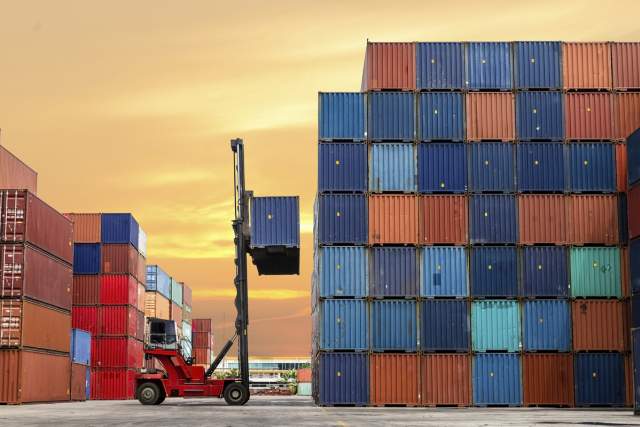In just the past few years, the merits of international trade have come under intense public scrutiny.
This has been a remarkable reversal, given that prior to 2016 there appeared to be a settled consensus in favor of free trade and ever closer economic integration across countries. There is now a resurgence of protectionism and, particularly, the use of tariffs. Free trade has taken the blame for job losses in the United States’ manufacturing sector, while multilateral organizations such as the WTO and regional trade agreements such as NAFTA have been criticized as “unfair.”
In the midst of this anti-globalization fervor, it is easy to lose sight of the many positives that free trade has enabled over the past few decades. Here are five things I know about international trade, to help sort through this rhetoric and remind ourselves what is at stake.
1. International trade is not a zero-sum game.
There has been a tendency in the recent political discourse to portray international trade relationships as zero-sum games: Either I win and you lose, or you win at my expense. For example, politicians have asserted that China and Mexico have “won,” while the U.S. has “lost out,” as a result of the U.S. being so open to trade with the rest of the world.
This isn’t Game of Thrones, where there can only be one winner. Trade has benefited China and Mexico a lot. But let’s be honest: it has benefited the U.S. as a country too.
But the basic truth is that most trade relationships are “win-win” affairs. These days, countries trade with each other not at gunpoint, but because they find these relationships to be mutually beneficial. The U.S. gets to import goods that the rest of the world can produce more efficiently and cheaply. At the same time, U.S. companies find ready access to foreign markets when they export American brands and products that are in demand by the rest of the world.
In other words, this isn’t Game of Thrones, where there can only be one winner. Trade has benefited China and Mexico a lot. But let’s be honest: it has benefited the U.S. as a country too. American consumers have access to a wider range of goods, often at lower prices, while American companies have had the opportunity to become more efficient and profitable by organizing their production along global value chains. We need to recognize that we are jeopardizing these gains with protectionist policies.
2. Some workers are inevitably hurt by competition from imports, but well-designed policies can mitigate this pain.
Although trade tends to expand the size of the economic pie, we need to acknowledge that certain industries and firms suffer from more intense competition from imports. Some argue that imports from China and Mexico have displaced domestic production, causing a decline in U.S. employment in traditional manufacturing industries. This may be true, but is the best response to throw up more barriers against imports?
To think this through, it is helpful to draw an analogy. When smartphones debuted, they quickly disrupted the telecommunications industry by bringing information to users’ fingertips. Within a matter of years, this technology displaced companies in the first-generation cell-phone industry. Motorola, for example, fell by the wayside. But we did not hear calls at the time for a tax on smartphones in order to help save manufacturing jobs at Motorola. Presumably, this new technological advance was seen to be a net gain to the U.S. economy.
Opening up to trade also presents an opportunity for a net gain to the U.S. economy, as the U.S. can then specialize more in those industries in which it has a greater comparative advantage and hence a greater global edge.
When the industry disruption takes the form of competing imports, we much more readily give in to the temptation to raise a tax on the new source of competition. Perhaps this is simply borne out of natural nationalistic instincts, or a suspicion that foreign firms might be competing in an “unfair” manner. However, we need to recognize that opening up to trade also presents an opportunity for a net gain to the U.S. economy, as the U.S. can then specialize more in those industries in which it has a greater comparative advantage and hence a greater global edge. In fact, even while the U.S. saw manufacturing job losses over the past two decades, it also witnessed a healthy growth in non-manufacturing jobs—particularly, in services—which have outstripped the decline in manufacturing employment.
In other words, protection and tariffs should not be the policy of first resort. There are other more targeted policies that can be enacted to cushion the blow for workers who have been adversely affected by import competition. For example, by providing a stronger unemployment safety net, the Trade Adjustment Assistance program in the U.S. is meant to serve precisely this purpose. The U.S. could also provide worker subsidies to encourage people to upgrade their skills and transition to an industry where stable job opportunities are more plentiful.
3. Tariffs are a self-inflicted wound on the U.S. public.
In the ongoing U.S. tariff wars, some have argued that tariffs are a pain-free policy. The claim here is that China or Mexico would end up paying for the tariffs that have been levied on their goods. In fact, this is a much too optimistic pronouncement.
Consider the following scenario. If the government of the city or town where you live were to introduce a new 25 percent tax on all goods purchased at the local grocery, who do you think would end up bearing the burden of that tax? Perhaps your local grocer might decide to absorb some of the increase in prices. But you would certainly expect to shoulder some of that burden too, through a higher price of groceries.
The same logic holds with a tariff on imports. One should not expect foreign firms to absorb a tariff in its entirety. At least some of the cost of the tariff would be passed on to U.S. consumers in the form of a higher price for imports.
But if imported goods were to become more expensive, why wouldn’t consumers switch to cheaper domestic alternatives? Because domestic companies have little reason to set their prices lower than that of the imported goods they are competing against. In short, tariffs are likely to inflict higher prices on consumers, regardless of whether they purchase imports or from domestic firms.
4. Tariffs are a self-inflicted wound on American companies.
The harm from tariffs extends well beyond their effects on consumer prices. Much of international trade today takes the form of trade in parts and components, reflecting how much firms seek to leverage the best inputs that each country can offer. Tariffs that blanket all products —including inputs and goods-in-process—would have a profound impact on the cost structure of many global firms.
It is no surprise then that American businesses have already begun to re-evaluate their global supply chain strategies, including searching for alternative sources of inputs that would not be affected by the newly-announced tariffs. This is a clear sign that American companies do feel economic pressure from tariffs. It’s reasonable to expect that production costs are likely to rise for U.S. firms, which would be a further setback for American manufacturing.
5. Trade economists need to do a better job making the case for free trade.
One thing is for sure: economists need to get better at communicating the strengths of free trade to the general public. Admittedly, mainstream economists have been caught off-guard by the ease and speed with which anti-globalization policies have found support again. The arguments in favor of free trade were seen as so self-evident—“How could anyone suggest otherwise?”—that we became complacent, and now we have to work extra hard to push back against the anti-globalization tide. This has been a failure of communication, not conviction.
We need to find better ways to persuade the general public that such instincts towards protectionism would ultimately be deleterious.
The task ahead though is clearly a difficult one. It is much easier to assert that imports have cost jobs in the U.S. manufacturing sector, and therefore that the “obvious” response should be to place tariffs on those imports. Somehow, this argument just makes for a better sound bite.
We need to find better ways to persuade the general public that such instincts towards protectionism would ultimately be deleterious. Consumers would be hurt by higher prices, which tend to place a greater strain on lower-income households than on those at the top of the income spectrum. Industries that receive short-term protection often end up losing their global competitiveness in the long-run.
How do we convince the public that tariffs are a blunt tool to cushion workers from the pitfalls of globalization, and come with many unintended consequences further down the road? How do we make the case that a world trading system based on agreed rules is better than a world in which countries wield tariffs unilaterally? These are critical challenges that lie ahead for trade economists, to make a more persuasive case for free trade.
Davin Chor is an associate professor in Tuck’s Economics group and the chair of Dartmouth’s academic cluster on globalization, which studies the far-reaching repercussions of globalization on world markets, governments, trade, and society. Professor Chor’s current research focuses on international trade and political economy.

